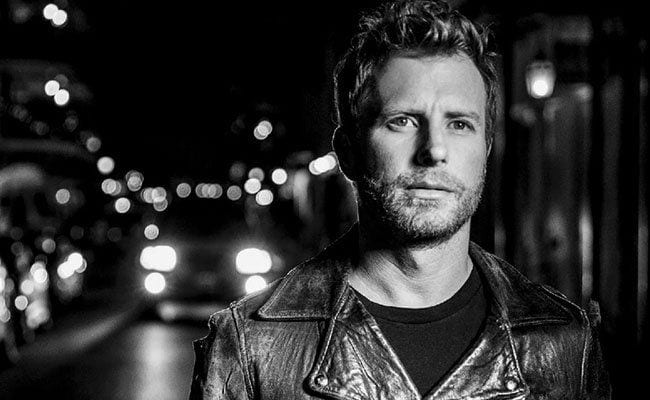
There’s a fog hanging over Dierks Bentley’s ninth album Black. A strategic fog, perhaps. The black-and-white album cover photo is set up so he looks caught off guard, like he’s been caught doing something he shouldn’t. The songs project a feeling of anxiety, of life being unsettled.
There’s a duet with Maren Morris, “I’ll Be the Moon”, where the protagonists are drinking, driving and kissing in the dark. He’s been seeing her even though she’s with someone else, and he’s trying to feel OK with it, with being the second man, living in the dark: “He can be the sun / I’ll be the moon.” As listeners we’re not fully convinced. Is she? On “Why Do I Feel”, he is the jealous one. The song crawls, with him sort-of rapping, sort-of rambling in a lackadaisical way. The words suggest that he’s bringing these dark feelings on himself, that they all live mainly in his head. “How much reassurance does a man need?”, is the question of the day. In other words, what makes a man feel so unsettled, even when things are going fine: a question the album overall echoes musically, thematically, in his voice and words and expressions.
“Unsettled” is the word. On “Pick Up”, he wants someone to pick up the phone no matter what they have to say (words of love or hate). He’s voiceless, wanting to be in control of a situation and frustrated that he can’t be. Perhaps there’s some broader masculine crying-out-for-power that’s at play here, something one could extrapolate with national or international implications.
A similar lack of control is played for apparent laughs in “What the Hell Did I Say”, though the tone is as unsteady as on the others. There’s a mystery here that feels familiar to the genre (he was drunk last night, and can’t remember what happened) but also different, with the focus on communication that might be more universal than the scenario. He’s not sure to what he agreed, what he promised, what lies or truth he told her. His underlying worry seems to be commitment. Did he tell her they’d get married? Did he promise away his ‘freedom’?
The “fun” songs are still not that fun beneath the surface. “Somewhere on a Beach”, a spiritual but not literal sequel to 2014’s “Drunk on a Plane”, is a fist-pumping kiss-off song, but it seems obvious that nothing the narrator says is true. He paints a picture for his ex of his new life on the beach with a perfect, easy, drunken girlfriend, but where does the truth lie?
“Mardi Gras” is a party, with vaguely New Orleans-esque horns, but its subject is heartbreak. He’s finished, he’s been demolished. “Roses and a Time Machine” is a ‘I want a do-over’ song with a premise and delivery that are meant to be funny. Mainly he seems deluded into thinking he can change things or could have ever changed things. On “Different for Girls”, his telling himself that girls take breakups harder and men can shrug them off seems like displacement. “The guys they can just act tough / so tough”, he says, and “act” is a keyword.
It’s no surprise that the serious, message song here, his litany of cliches in service of an unclear metaphor, is about “Freedom”, something for which he seems to be searching throughout. “Freedom” is supposed to be the album’s big statement about humanity (“everybody wants the same thing / we want to taste that freedom”), with nationalistic and theological overtones. The tone is so downtrodden it convinces you Bentley knows true freedom doesn’t exist.
The lightest moment on the album is “All the Way to Me”. It’s a break in the clouds, an introspective attempt at re-centering that draws benefit from its airy atmosphere and how it contrasts with the fog hanging over the rest of Black. Still, part of the story here is the way memories of scents, feels, and images play with your head and pierce your heart, whether they’re good ones or bad.
“Light It Up” tries to close the album with happy and spiritual moments of grace and redemption. Is it convincing, after all that’s come before? Not hardly. Instead, the album counters that message with the closing statement that all of our memories are haunting, disappointing ones on “Can’t Be Replaced”. “There’s just some things that can’t be replaced”, he sings, in a way that says nothing can be replaced or relived or revived.
Black feels like the embodiment of the masculine midlife crisis, with a similar lack of self-awareness on the part of the protagonist, even when he’s expressing realizations and moments of self-discovery. If you’re into analyzing music through the artist’s personal life, you could get caught up in why this work of tender cynicism is titled after his wife’s maiden name, with “Black” printed on the cover so it appears as part of his name. Then there’s “Black”, the title song, perhaps a love song, but one where sex is a nullifying force and moments of passion are used to obliterate emotions and their complexity. In the world of Black, “Make my world go black” is an expression of love, or as close as one man can get.


![Call for Papers: All Things Reconsidered [MUSIC] May-August 2024](https://www.popmatters.com/wp-content/uploads/2024/04/all-things-reconsidered-call-music-may-2024-720x380.jpg)



